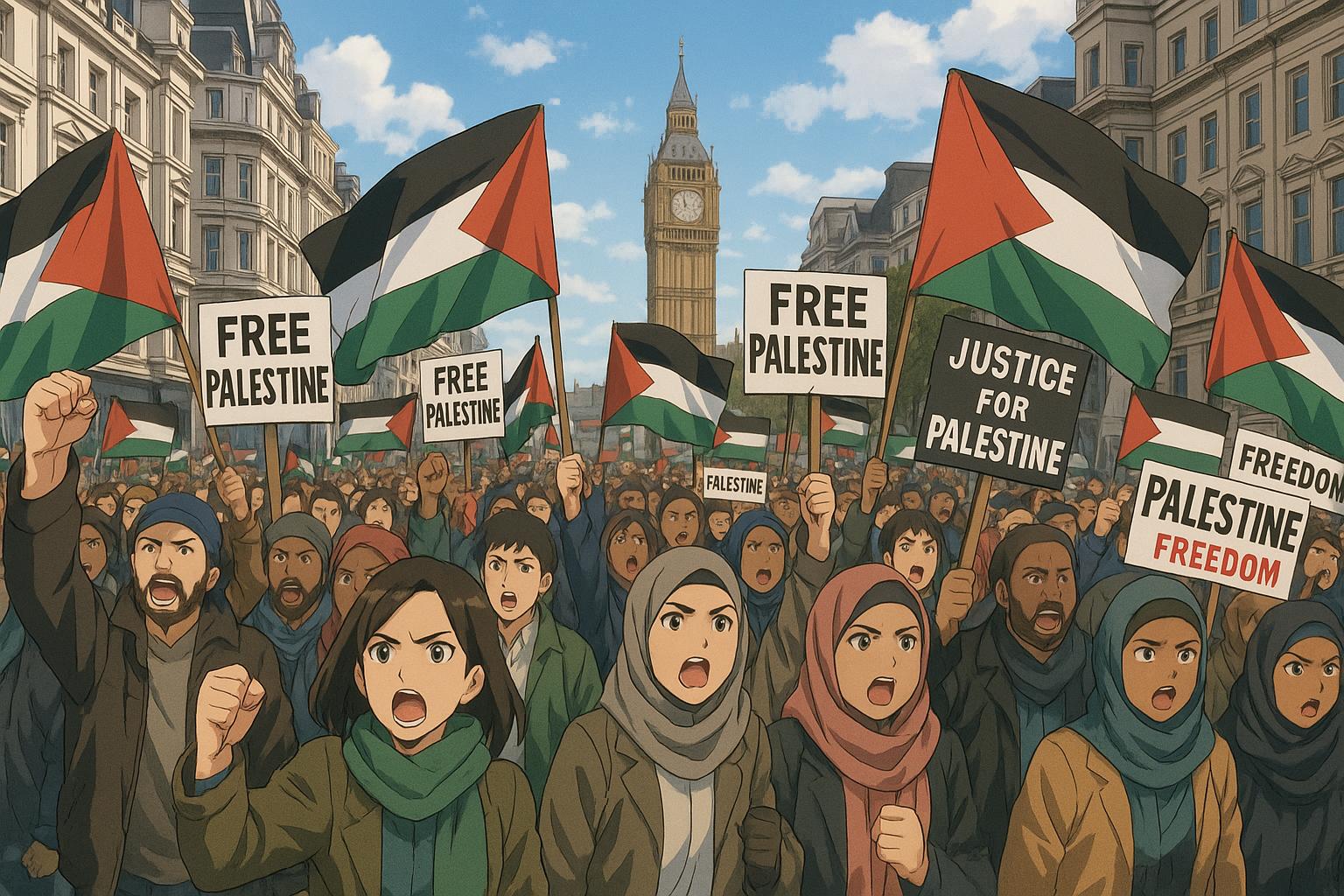On a vibrant Saturday in central London, the streets were transformed into a sea of solidarity as over 500,000 individuals marched in support of Palestine. This demonstration, marking the 27th national rally since the onset of intensified conflict in October 2023, stands as a testament to the enduring strength and expansion of the Palestine movement in the UK. Protesters filled iconic locations such as Downing Street and Westminster Bridge, their chants echoing a collective call for justice against what many have termed a genocide.
This latest mobilization reflects a growing trend within the movement: according to a mass survey conducted by Socialist Worker, approximately one in eight participants were attending their first national demonstration. First-time marcher Doaa articulated a sentiment echoed by many, noting, "They’re trying to silence us, but they can’t take away our voices." Her words underscored the determination of demonstrators to resist not only the violence faced by Palestinians but also the broader implications of Western foreign policy.
The timing of the march was significant—it coincided with the 77th anniversary of the Nakba, a day of remembrance for the displacement of over 800,000 Palestinians following the founding of Israel in 1948. This historical context fuels a sense of urgency among participants. Jamilla, another marcher, expressed the necessity of acknowledging that the current crisis did not emerge suddenly on October 7, 2023, but is rooted in decades of oppression.
The march served as a platform for voices from diverse backgrounds, including Holocaust survivor Stephen Kapos, who articulated his dismay at the government’s attempts to suppress public dissent. “Their only response is to slander and abuse these marches—but they aren’t succeeding,” he asserted, highlighting a common frustration among protesters towards the state’s narrative surrounding the movement.
A palpable anger was directed towards Labour leader Keir Starmer, whom demonstrators accused of betraying human rights principles. As Iqbal pointed out, “Starmer’s a human rights lawyer. Tell me, where’s the humanity in blowing people up?” This sentiment was echoed across the crowd, with many lambasting mainstream media coverage as biased in favour of Israel. Julia from Barking articulated how the rhetoric from Labour politicians resonated with that of far-right parties, saying, “To see Starmer and Labour politicians say that is disgusting and won’t be tolerated—we will stop it.”
Union representation was also notable at the march, with banners from several organisations prominently displayed. Gary, a member of the Coventry and Northamptonshire branch of the CWU union, stated, “Trade unions should be on the side of the oppressed—and I can think of no better example of modern oppression than the horrific genocide in Gaza.” Such solidarity illustrates a growing intersectionality within the movement, drawing links between various struggles for justice.
Despite the government's efforts to curtail the Palestine movement, protesters remain resolute. Activists such as Ewan from the NEU emphasised the need for union leadership to translate public statements into action, advocating for more disruptive forms of protest. They argue that as long as arms are being sent to Israel, British complicity in the violence against Palestinians will continue.
As demonstrators filled Whitehall, left-wing MP Apsana Begum delivered a poignant address, reflecting on the humanitarian crisis unfolding in Gaza. “Starvation is being deployed as a weapon of war. 2.3 million Palestinians are being denied food and medical aid,” she highlighted, reinforcing the urgency for immediate action.
Historian William Dalrymple also spoke to the crowd, weaving historical context into contemporary demands. He drew attention to the long-standing suffering of Palestinians, remarking, “For 77 years, Palestinians have been terrorised into leaving their homes and farms.” His reflections resonated with many, as the movement seeks to reclaim narratives often sidelined by mainstream discourse.
Amidst the palpable anger and frustration, there remains a spark of hope among the demonstrators. For them, protests signify not only an assertion of solidarity with Palestinians but also a broader push against systemic injustices. As Shama articulated, calls for boycott, divestment, and sanctions (BDS) remain paramount, alongside a recognition of interconnected struggles, including those for LGBTQ+ rights.
The sheer scale of the demonstration reflects a growing discontent with the status quo, particularly as divisions within political establishments, such as the one illustrated by the Financial Times, reveal cracks in the facade of governmental unity on foreign policy. The editorial posited that “the longer it goes on, the more those who remain silent or cowed from speaking out will be complicit,” signalling a profound reckoning with the West's response to the ongoing crisis.
As the demonstration concluded, there was a palpable sense that this was not merely another protest but part of a larger struggle for justice, echoing across generations and transcending borders. For the participants, the fight for a free Palestine continues, and their voices, far from being silenced, are growing louder and more unified.
Reference Map
- Paragraphs 1, 2, 3, 10, 11, 12
- Paragraphs 1, 4, 6
- Paragraph 3
- Paragraph 5
- Paragraph 6
- Paragraph 7
- Paragraph 8
- Paragraphs 9, 10
- Paragraphs 12, 13
- Paragraph 14
Source: Noah Wire Services
